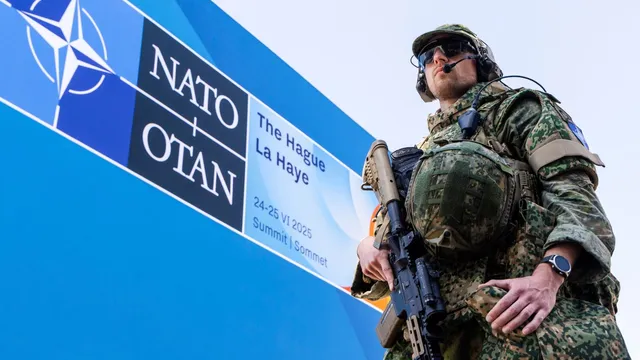
Pro-Russian hackers target NATO summit with coordinated attacks
2025-06-24 09:21- A group of pro-Russian hackers initiated denial-of-service attacks on June 24, targeting several municipalities linked to the NATO summit.
- Concurrent investigations are underway regarding potential sabotage of the rail network, attributed to a power outage at Schiphol Airport affecting train services.
- The incidents highlight escalating security concerns leading to heightened measures for safeguarding the summit, marking an unprecedented mobilization of police and military resources.
Express your sentiment!
Insights
In the Netherlands, pro-Russian hackers have targeted several municipalities and organizations linked to a NATO summit occurring on June 24 and 25, 2025. The Dutch government reported a series of denial-of-service attacks that began on Monday, coinciding with the preparations for the summit. This escalation in cyber-attacks appears to have been orchestrated by a group known as NoName057(16), who follows pro-Russian ideological motives. The attacks overwhelmed various online services, increasing traffic and causing disruptions but did not impact the overall functioning of critical services in The Hague where the summit is being held. On the same day, Dutch authorities initiated an investigation into a separate incident involving possible sabotage against the rail network. This investigation was prompted by a power outage affecting train services to and from Amsterdam's Schiphol Airport, which occurred just as leaders began arriving for the NATO event. Emergency officials suspect that fires set deliberately in around 30 rail cables may have caused the outage. The Justice Minister of Netherlands, David van Weel, indicated that the sabotage could have been instigated by an activist group or potentially another state. The incidents have raised security concerns, leading to an unprecedented security operation called Orange Shield. This operation encompasses extensive measures, including road closures and airspace restrictions, as around 27,000 police officers and more than 10,000 military personnel are deployed to ensure the safety of world leaders attending the summit. It is the largest security mobilization in Dutch history, underscoring the high stakes and tensions surrounding this NATO gathering. In addition to the cyber threat and possible sabotage, past events have indicated that critical infrastructure could be intentional targets during significant international events. Last year, similar actions were observed in France prior to the Olympic Games, where coordinated sabotage was executed on key rail routes, demonstrating a pattern of targeting transport networks during global events. As investigations continue, authorities are coordinating with international cybersecurity experts to reinforce defenses against ongoing attacks and to identify the perpetrators behind these incidents.
Contexts
The impact of cyber attacks on NATO summits has grown increasingly significant in recent years, reflecting a broader trend of rising cyber threats globally. As NATO continues to evolve its strategic priorities, the susceptibility of its summits to cyber incidents represents a critical vulnerability. These summits are not only diplomatic gatherings but also platforms for decision-making that can influence military and political dynamics across the member states. Given the geopolitical landscape, adversaries are keen to exploit technological vulnerabilities to undermine trust, disrupt dialogue, and potentially manipulate outcomes to their advantage. A notable aspect of these cyber attacks is their diverse nature, which ranges from Distributed Denial-of-Service (DDoS) attacks aimed at overwhelming network infrastructure to sophisticated phishing schemes targeting individuals with access to sensitive information. Historical cases illustrate that state and non-state actors often leverage these tactics during or in close proximity to NATO summits, revealing a pattern of strategic timing that seeks to maximize disruption and impact. The repercussions of successful cyber incursions can lead to compromised communications, leaked sensitive documents, and a general erosion of confidence among allies, emphasizing the critical need for robust cybersecurity measures. NATO has recognized the importance of safeguarding its digital infrastructure, responding by enhancing its cyber defense capabilities and integrating cybersecurity into its broader strategic framework. Initiatives such as the NATO Cyber Defence Centre of Excellence in Tallinn, Estonia, serve to bolster the alliance's collective capacity to respond to cyber threats. Furthermore, member states are encouraged to share intelligence and collaborate on best practices, fostering a united front against adversarial cyber actions. Nevertheless, the fast-paced nature of technological advancements poses ongoing challenges, necessitating continuous adaptation and investment in both defensive and offensive cyber capabilities. As cyber threats continue to evolve, the importance of a cohesive strategy that addresses both prevention and response cannot be overstated. The ability to not only defend against attacks but also to conduct countermeasures in the cyber domain is becoming increasingly vital to NATO’s overall security strategy. Ultimately, the successful navigation of cyber challenges at NATO summits will depend on a well-coordinated effort that combines technological solutions, international cooperation, and a commitment to maintaining the integrity of democratic processes within the alliance.